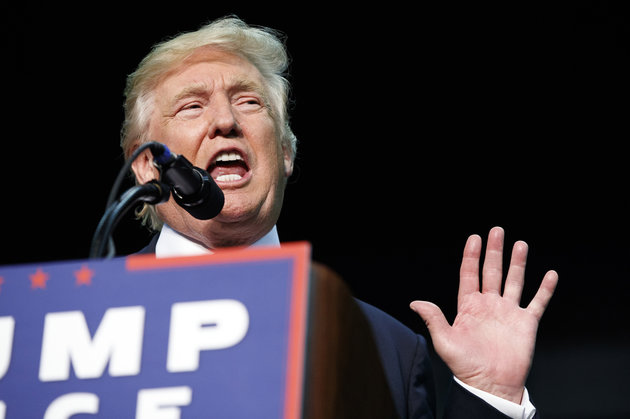
Donald Trump has been working a new closing refrain into his stump speeches over the past week, in which he promises to bring the nation together under a single God.
“We will be one people, under one God, saluting one American flag,” he said Monday at a speech to the National Guard Association in Baltimore. Moments before, he claimed he’d be a “president for all Americans” in an effort to portray himself as more of a uniter than his rival, Democrat Hillary Clinton.
Trump’s “under one God” line may sound like boilerplate presidential campaign rhetoric, even if it is a bit, um, Hitlerian. (The Nazi Party slogan was “Ein Volk, ein Reich, ein Fuhrer!” ― or, “One people, one empire, one leader!”) But the inclusion of the word “one” is new. A review of transcripts suggests he debuted it last Tuesday during a speech in Greenville, North Carolina, and has since used it in campaign speeches in Philadelphia, Pennsylvania; Pensacola, Florida; and Washington, D.C.
Broad overtures to notions of the U.S. as a “Christian nation” built on “Judeo-Christian” values are hardly uncommon in American politics. But a presidential candidate vowing to unite all Americans under “one God” can hardly be viewed as inclusive. Trump’s campaign even capitalized the “One God” phrasing in his prepared remarks for his Pensacola rally.
“By his very nature, Trump is always dividing and excluding. That’s what he does, and that’s what this statement does,” Alan Wolfe, director of Boston College’s Boisi Center for Religion and American Public Life, told The Huffington Post.
Trump’s language appears to conflict with the freedom of religion enshrined in the First Amendment, which holds that people in the U.S. have the right to practice whichever religion they choose, or none whatsoever. Many Americans subscribe to polytheistic theologies and may worship many Gods. Followers of monotheistic religions also have differing views about the supreme being they worship. And let’s not forget the growing ranks of religious “nones,” including atheists, agnostics and others who don’t consider themselves members of a traditional religious affiliation.
Does Trump really expect all of these people to unite “under one God”? The Trump campaign did not respond to a request for clarification.
It seems more likely that Trump isn’t speaking at all to the nearly 30 percent of Americans who don’t consider themselves Christian. In fact, it’s hard to see his new oratorical coda as anything other than a dog whistle to his base and specifically white, evangelical Christians, who are often distrustful of other religious groups. Such a strategy would be consistent with broader themes of Trump’s campaign, which has regularly come under fire for embracing blanket Islamophobia and coddling Christian white supremacists.
It might also be particularly appealing to evangelicals who feel more fervent forms of religious expression have fallen victim to the same political correctness that Trump has railed against throughout his presidential run, said Wolfe.
“Evangelicals have learned that we really don’t talk that way anymore,” he said. “They may do it in private, but their public language tries to reach out, tell people they can be saved in a different kind of way, or that different Gods can equal.”
“But if they believe that only through Jesus lies the path to salvation, then in all honesty they must believe that Jews and other people that don’t make Jesus their primary prophet are not on the path to salvation and will burn in hell,” Wolfe continued.
Trump has ramped up his outreach to evangelical Christians after winning their support in the Republican primaries and subsequent general election polling, despite numerous questions about his views on marriage equality and abortion rights.
Speaking to the Christian conservative Value Voters Summit last week in D.C., Trump promised the audience he’d make it worth their while.
“A lot of people said: I wonder if Donald will get the evangelicals,” he said. “I got the evangelicals. I’m going to make it up to you too, you watch.”


